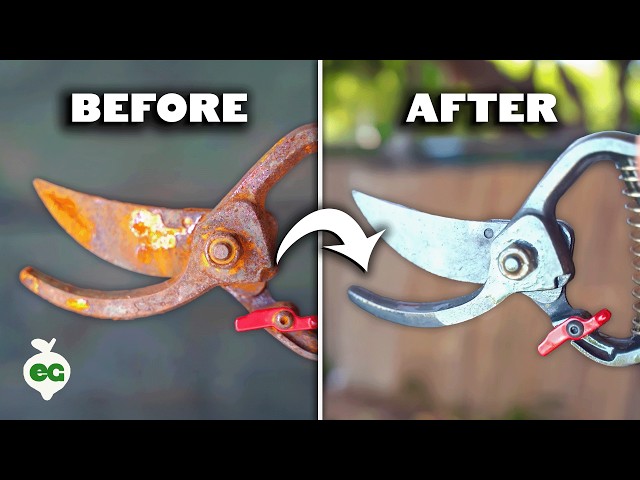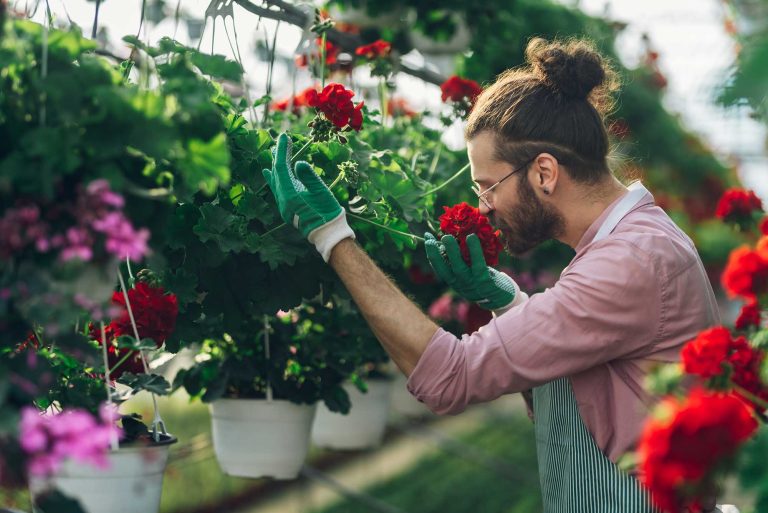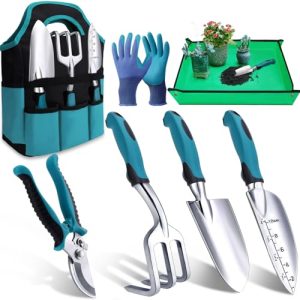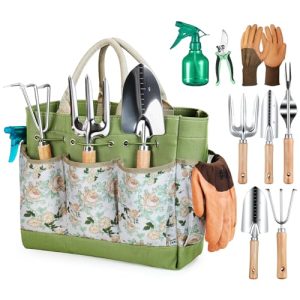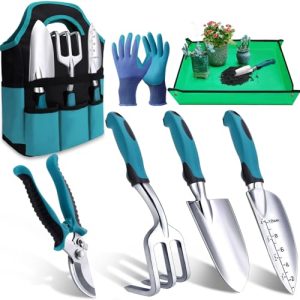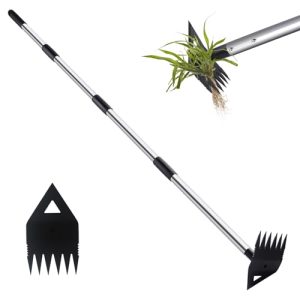Have you ever pulled out your trusty garden tools, only to find them covered in rust? This common problem can be frustrating, especially when you’re eager to get your hands dirty in the garden.
But don’t worry—there’s an easy and effective solution that you already have in your kitchen. Vinegar is a powerful ally in the battle against rust, and you can use it to restore your tools to their former glory. Imagine the satisfaction of seeing your tools gleam again, ready to tackle any gardening task.
The best part? You don’t need harsh chemicals or expensive cleaners. With just a few simple steps, you can effortlessly remove rust and prolong the life of your tools. Keep reading to discover how vinegar can work its magic on your garden tools, making them look and perform like new.
Why Rust Forms On Garden Tools
Rust forms on garden tools due to moisture and oxygen exposure. Vinegar effectively removes rust, restoring the tools’ shine.
Rust is a common problem for garden tools. It occurs when iron reacts with moisture. This reaction creates iron oxide, known as rust. Rust can weaken tools and make them less effective. It is crucial to understand why rust forms to prevent it.Moisture Exposure
Garden tools are often left outside. Rain, dew, and humidity can cause rust. These tools need protection from moisture. When tools are wet, they rust faster. Keeping them dry is essential.Metal Composition
Many garden tools contain iron. Iron is prone to rusting. Tools made with steel or iron are at risk. Using tools with rust-resistant materials can help.Lack Of Maintenance
Proper care can prevent rust. Cleaning and drying tools after use is important. Neglecting maintenance leads to rust. Regular care keeps tools in good condition.Environmental Factors
The environment impacts rust formation. Coastal areas have salty air, which speeds up rusting. Areas with high humidity also see more rust. Knowing your area’s conditions can help protect your tools.
Credit: www.facebook.com
Benefits Of Using Vinegar
Vinegar dissolves rust on garden tools effectively. Soak tools in vinegar overnight, then scrub gently to restore shine. This natural method is cost-effective and environmentally friendly.
Removing rust from garden tools can be a daunting task, but using vinegar offers a simple and effective solution. Vinegar is not only affordable but also eco-friendly, making it a popular choice among gardeners. This natural acid is gentle enough to avoid damaging your tools while still being powerful enough to remove stubborn rust. Let’s dive into the benefits of using vinegar for rust removal.Cost-effective Solution
Vinegar is a budget-friendly option that you likely already have in your kitchen. No need to purchase expensive rust removers or special equipment. Just a bottle of vinegar can go a long way in keeping your garden tools in top shape.Environmentally Friendly
Unlike chemical rust removers, vinegar is a natural substance that won’t harm the environment. You can clean your tools without worrying about releasing harsh chemicals into your garden soil or water sources.Easy To Use
Using vinegar to remove rust is straightforward. Simply soak your tools in vinegar and let them sit for a few hours. The acid in the vinegar will dissolve the rust, making it easy to wipe away. No scrubbing or heavy lifting required.Safe For Your Tools
Vinegar is gentle on metals, so it won’t damage your tools like some abrasive methods might. This ensures that your tools remain functional and extend their lifespan, saving you from frequent replacements.Multipurpose Cleaner
Vinegar isn’t just for rust removal; it’s a multipurpose cleaner that can tackle grease and grime too. After removing rust, you can use it to clean the rest of your tools, ensuring they’re spotless and ready for use. Consider your garden tools: are they looking a bit worse for wear? Why not give vinegar a try and see how it transforms your rusty tools into gleaming, efficient companions?Gathering Necessary Supplies
Gathering the necessary supplies is the first step in removing rust from your garden tools using vinegar. This simple yet effective method requires just a few materials, making it easy for anyone to tackle. Whether you’re an experienced gardener or a weekend warrior, having the right supplies on hand can make the process smooth and efficient.
Selecting The Right Vinegar
Not all vinegars are created equal when it comes to rust removal. Choose white vinegar for its strong acidity and affordability. This common household item works wonders in breaking down rust particles.
If you have apple cider vinegar, it can be a good alternative, although it might take a bit longer to work. Avoid balsamic or flavored vinegars, as they contain additives that can interfere with the rust removal process.
Other Materials Needed
- Container:Opt for a container large enough to fully submerge your tools. A bucket or basin can work well. Ensure it’s non-metallic to prevent any reactions.
- Scrubbing Brush:A stiff-bristled brush helps scrub off loosened rust. An old toothbrush can be handy for smaller tools or intricate areas.
- Rags or Towels:Use these to wipe your tools clean after soaking. Old rags work perfectly, so you don’t have to worry about staining them.
- Gloves:Protect your hands from the acidic vinegar and sharp edges of tools. Rubber or latex gloves are ideal.
Have you ever found yourself halfway through a project only to realize you’re missing something essential? Ensuring you have all these materials ready will save you time and frustration.
With these supplies gathered, you’re well on your way to restoring your garden tools and prolonging their lifespan. Are you ready to see your tools shine like new again?

Credit: www.crcindustries.com
Preparing The Tools
Gather essential tools like a scrub brush, gloves, and white vinegar. Ensure they are all within reach. Proper preparation speeds up the rust removal process and guarantees effectiveness.
Before you embark on the journey of removing rust from your garden tools with vinegar, it’s crucial to prepare them properly. Proper preparation ensures that vinegar can work effectively, allowing you to achieve the best results. This process involves a few straightforward steps that will make a significant difference in the outcome.Cleaning Off Dirt And Debris
Begin by giving your tools a good scrub to remove any dirt or debris. Use a stiff brush or an old rag to wipe away soil, leaves, and other residues. This step is essential because any remaining dirt can hinder the vinegar’s ability to contact the rust directly. Think about the last time you tried painting over a dirty surface—it just doesn’t stick well. The same principle applies here. Your tools will only benefit from the vinegar bath if they’re free from grime.Disassembling Tools If Needed
Consider disassembling your garden tools if they have moving parts. Removing screws and nuts allows vinegar to reach all the rusty nooks and crannies. You might be wondering if disassembly is really necessary. If your tools are heavily rusted, this step can make a big difference. It ensures that every part gets cleaned, not just the visible areas. Having a basic toolkit on hand can simplify this process. Plus, reassembling your tools after cleaning can be a satisfying task, knowing you’ve given them a new lease on life.Soaking Process
Soak rusty garden tools in vinegar for several hours to loosen the rust. Gently scrub the tools with a brush to remove residue. Rinse thoroughly and dry to prevent future rusting.
The soaking process is a simple and effective way to remove rust from garden tools. It allows vinegar, a natural rust remover, to work its magic. This method is both cost-effective and environmentally friendly. Let’s dive into the details.Creating The Vinegar Solution
First, gather your materials. You need white vinegar and a container that fits your tools. Fill the container with enough vinegar to submerge the rusty parts. Ensure the vinegar fully covers the rusted areas.Soaking Duration And Tips
Let the tools soak for at least 12 hours. For heavily rusted tools, extend the time to 24 hours. Check the tools occasionally during soaking. This ensures the rust is loosening. If the rust is stubborn, consider gently scrubbing it with a brush during the soak. Rinse the tools thoroughly after soaking. Dry them well to prevent new rust.Scrubbing Off Rust
Scrubbing off rust from your beloved garden tools can be both satisfying and rewarding. Imagine transforming a rusty old spade into a shiny, reliable companion for your gardening adventures. Vinegar helps loosen the rust, but the real magic happens when you scrub it off. Let’s dive into how you can effectively scrub away rust using simple techniques.
Choosing The Right Brush
Selecting the perfect brush makes all the difference. A wire brush is often the most effective tool for tackling stubborn rust. It can reach into nooks and crannies, ensuring no rust is left behind.
Consider the size of your garden tools. For larger surfaces, a big brush covers more area quickly. For intricate tools or smaller spots, opt for a smaller brush to give you more control.
Plastic brushes are a gentle alternative for delicate tools. They’re less abrasive, reducing the risk of scratching the surface.
Techniques For Effective Scrubbing
Start by applying vinegar generously to the rusty area. Let it sit for a few hours to loosen the rust. This step is crucial for effortless scrubbing.
When scrubbing, use firm, consistent strokes. Imagine you’re polishing a new piece of jewelry, aiming for a smooth finish.
Don’t shy away from scrubbing in different directions. This ensures rust is removed from all angles, leaving your tools pristine.
Pause occasionally to wipe away loosened rust with a cloth. This helps you see your progress and encourages you to keep going.
Scrubbing rust off your garden tools not only revitalizes them but also saves money. Why buy new tools when a little elbow grease can restore them? What other creative ways do you use to maintain your gardening gear?
Rinsing And Drying
Rinsing and Drying After soaking tools in vinegar, rinse them thoroughly with water to remove all rust residues. Dry completely using a clean cloth to prevent moisture, which can cause rust to form again.
Rinsing and drying your garden tools after removing rust is crucial. Proper care ensures longevity and functionality. Neglecting these steps can result in future rust issues. A thorough rinse and dry keep your tools in top shape.Proper Rinsing Techniques
After soaking tools in vinegar, rinse them with clean water. Use a garden hose for ease and effectiveness. Ensure all vinegar residue is removed. Check small crevices and joints. These areas often trap vinegar. Persistent vinegar can cause damage if left unchecked.Ensuring Complete Drying
Once rinsed, drying your tools is key. Use a clean, dry cloth to wipe off excess water. Pay attention to joints and handles. Moisture trapped here can lead to rust. Leave tools in a sunny spot for natural drying. Alternatively, use a hairdryer for quicker results. Ensure all parts are completely dry before storing.Preventing Future Rust
Protect garden tools from future rust by soaking them in vinegar. This simple method removes rust effectively. After cleaning, dry tools thoroughly to prevent rust formation.
Preventing rust from taking over your garden tools is crucial for maintaining their longevity and performance. Once you’ve successfully removed rust using vinegar, it’s time to focus on preventing it from coming back. Implementing a few simple practices can save you time and effort in the long run.Regular Maintenance Tips
Make it a habit to clean your tools after each use. Dirt and moisture are rust’s best friends. A quick rinse and thorough drying can work wonders. Sharpen blades regularly. Not only does this keep them effective, but it also prevents rust from forming on dull edges. Consider applying a light coat of oil to metal parts. This creates a barrier against moisture. Use household items like vegetable oil or WD-40 for this task.Storage Solutions
Store your garden tools in a dry place. Moisture is the enemy, so choose a location that stays relatively dry throughout the year. Hang tools on a wall rack. This prevents them from sitting on a damp floor, reducing the risk of rust. Use silica gel packs in toolboxes or storage areas. These packs absorb excess moisture, adding another layer of protection. Taking these steps can significantly extend the life of your tools. What’s your favorite method for keeping rust at bay? Implement these strategies and watch your garden tools last for seasons to come.Common Mistakes To Avoid
Skipping proper tool cleaning can leave rust on your garden tools. Rinse tools thoroughly after vinegar use to avoid vinegar residue.
Common Mistakes to Avoid Removing rust from garden tools with vinegar seems straightforward. Yet, many make mistakes that hinder results. This section highlights common pitfalls. Understanding these will help you achieve a better outcome.Using Undiluted Vinegar
Pure vinegar can damage tools. Dilute it with water. This balances acidity. Protects metal while removing rust.Leaving Tools In Vinegar Too Long
Extended soaking can weaken metal. Check every few hours. Remove tools once rust loosens. This prevents damage.Skipping Rinse After Soaking
Residual vinegar can corrode metal. Rinse tools with water. Neutralize acidity. This preserves tool integrity.Not Drying Tools Thoroughly
Moisture invites rust. Dry tools completely after rinsing. Use a towel or cloth. Store in a dry place. Prevents future rust issues.Ignoring Protective Coating
After cleaning, apply oil. Oil prevents new rust. It acts as a barrier. Keeps moisture away. Ensures long-lasting tool health.
Credit: www.facebook.com
Frequently Asked Questions
Can Vinegar Effectively Remove Rust From Tools?
Yes, vinegar is a natural and effective rust remover. Its acetic acid breaks down rust particles on metal surfaces. Soaking your garden tools in vinegar can dissolve rust. After soaking, scrub the tools with a brush to remove remaining rust.
Rinse and dry thoroughly to prevent future corrosion.
How Long Should Tools Soak In Vinegar?
For effective rust removal, soak tools in vinegar for 12 to 24 hours. This duration allows the vinegar’s acidity to penetrate and dissolve rust. For heavily rusted tools, soak longer if needed. Regularly check progress during soaking to avoid damaging the metal surface.
Is Vinegar Safe For All Garden Tools?
Vinegar is generally safe for most metal garden tools. However, avoid using vinegar on tools with delicate coatings or finishes. It can strip paint or protective layers. Always test a small area first. Ensure tools are thoroughly rinsed and dried after treatment to prevent corrosion.
What Type Of Vinegar Is Best For Rust Removal?
White vinegar is the best choice for rust removal. Its high acidity makes it effective for breaking down rust. It’s affordable and widely available. Other types of vinegar may work, but white vinegar is preferred due to its stronger acidity and cost-effectiveness.
Conclusion
Removing rust from garden tools is simple with vinegar. This method is easy, cheap, and effective. Vinegar breaks down rust without damaging the tools. Soak the tools overnight for best results. Scrub off remaining rust with a brush. Dry tools well to prevent future rust.
Regular maintenance keeps garden tools working like new. Vinegar is a great household solution. No need for harsh chemicals. Try this method and see the difference. Keep your garden tools in top shape with vinegar. Your garden will thank you.
